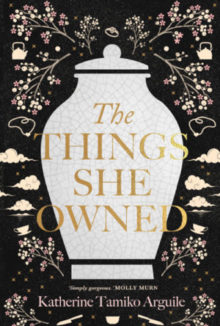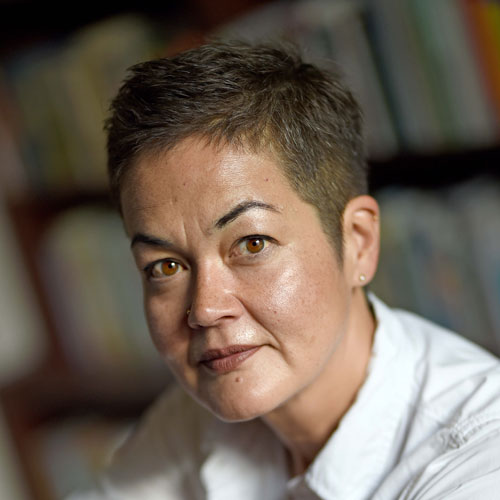Book extract: The Things She Owned
Adelaide author Katherine Tamiko Arguile explores themes of family and grief in her new novel The Things She Owned, the story of a tangled mother-daughter relationship that unfolds over two generations and is steeped in Japanese culture.

The Yanbaru forest, a sacred place on the island of Okinawa. Photo: Katsumi Tanaka / AP
Arguile, who was born and raised in Tokyo and attended boarding school in Britain, has drawn on her own cross-cultural experience to write her book, which will be published tomorrow by Affirm Press.
In alternating chapters, it tells the story of Erica, a young woman living and working as a chef in London, and her late mother Michiko, who grew up in Tokyo during World War II.
Erica’s fraught relationship with her complicated and often cruel mother has left her unable to put Michiko’s memory to rest – she lives with many of her belongings, as well an urn containing her remains – but a visit from a Japanese cousin brings the past to the fore and ultimately draws Erica to the magical island of Okinawa, the home of her ancestors.
The following extract is from the opening chapters of The Things She Owned.
∗∗∗∗
South China Sea, August 1979
The sun is blinding. When Erika closes her eyes, its rays pulse white beneath her lids. When she opens them she sees her mother against blue sky, magnificent, like a goddess. Michiko is wearing a cream swimsuit, showing off sun-bronzed skin. Permed black curls tumble from a red and white polka-dot scarf around her head. Erika searches her mother’s face. Sometimes she glimpses the eyes behind those huge Jackie-O sunglasses.
She stares at Michiko’s crimson lips sipping from a martini glass. An olive skewered by a toothpick rests against its rim, which Michiko holds in place with a scarlet nail as she drinks. She empties the glass and plucks the olive from its stick with her teeth, glancing sideways at the men around her on the yacht. Julian rushes forward to refill it.
 All afternoon Michiko drinks, reclining on the deck cushions, crossing and uncrossing her legs. She nods, giggles at the men. ‘Hontō—? Usō!’ she coos. Really? Oh, you’re such a liar!
All afternoon Michiko drinks, reclining on the deck cushions, crossing and uncrossing her legs. She nods, giggles at the men. ‘Hontō—? Usō!’ she coos. Really? Oh, you’re such a liar!
Michiko laughs at something Julian says. He’s acting the clown, entertaining his lover. He mimes walking the plank and goggles his eyes. He teeters into a handstand, leaps up to take a bow and struts about with his chest puffed out like a rooster. Michiko’s friend Marit laughs too, though not as loudly. Erika is happy Marit is here – she and her husband have come to visit them in Hong Kong. Marit is kind to Erika. She has a way of making Erika feel she can be herself and not get into trouble for it.
As the sun falls towards the sea, Michiko grows quiet. Erika can see she’s still smiling, though at no one in particular. Her eyes are focused somewhere beyond the horizon, her face pink and orange in the setting sun’s rays. When she looks peaceful like this, she doesn’t seem so frightening.
It’s the right moment. Erika lays her head in Michiko’s lap; Julian laid his head there earlier.
‘Ugh! Hot and sticky. Go play!’ Michiko pushes her off, pointing with the hand holding the glass, slopping icy vodka on Erika’s legs. The cold cuts through the heat of her skin. The shock of it is strange, like a burn and an itch.
Erika heads to the prow to curl into the cushions there. She’s never been on such an enormous yacht. She peers over the edge at the waves far down below, listening to the conversation and laughter behind her. She turns to look at her mother, who is holding out her glass again. One of the men, the blond one, leaps forward with a bottle.
The man stares at her mother as he pours. He has an odd expression on his face, and the glass is overflowing, the drink spilling into her mother’s lap. ‘Oh,’ cries Michiko, ‘so cold!’ And he takes a fistful of napkins from a tray and mops her lap; she twitches at his touch. Erika watches her mother covering the cloud of injection marks on her thighs with her palms while he wipes, watches Julian crossing his arms, his face darkening. The man sits close to Michiko and drapes his arm over her shoulder. He leans into her, whispering to her in a peculiar way with his face turned to the side so his mouth is close to her ear and his ear close to her lips, as if he wants to trap every word. Everything goes quiet.
Erika is so absorbed by the sight of her mother with the man that when Julian looms over her she jumps.
‘Hey kid! How about a swim?’
She loves swimming but feels a stab of fear when she thinks about being out here in the open ocean where her feet can’t touch the bottom. Maybe everything will be okay if she wears her water wings. Heart thrilling, she brings them to her mother and holds them out. The blond man is still curled around Michiko, murmuring. Erika waits for her mother to look at her.
‘Come on, kid, we haven’t got all day!’ Julian sounds angry.
Erika wonders if her real dad would have been more patient. Erika doesn’t know what he looks like because he left before she can remember, but she knows his name is George, which she thinks is a kind-sounding name. Her mother said that George left because he didn’t want Erika, but Erika knows that sometimes her mother lies.
‘Mama—?’
Michiko whips round. ‘“Mama” wa dame! Michiko desho!’
Erika holds up the floppy pieces of orange plastic. Her mother tuts and gestures to come closer. When she darts forward for them, Erika flinches, but Michiko just slips a wing onto each of Erika’s arms, purses her lips around the valves and blows, leaving crimson smears. The blond man stays where he is, watching. Erika suddenly wants to push him away, hard, both hands against his chest, but Michiko has her arm gripped tight. Erika feels her blood pulsing as the wings grow fatter, and when her mother roughly runs a forefinger inside the inflated water wing, she catches the soft skin of Erika’s inner arm. It hurts, but she makes no sound. She loves her mother too much at this moment, despite everything. She wants to sit close and put her arms around Michiko’s neck. She wants to be where the blond man is, closer, even, so she might merge back into her. She basks in the imagined gaze of a mother’s love, keeping very still, the way you’d keep still if you saw a deer in a clearing and didn’t want to scare it off. But then Michiko slaps her bottom with a laugh. ‘Go on, have swim,’ she says. ‘Julian take care of you.’
Erika heads for the long ladder that stretches all the way down the side of the yacht into the waves, but Julian picks her up from behind before she can reach it, grabbing her under the arms. He whirls her around.
‘Wa-haay! Whoo!’
It makes her laugh. He plays with her like this now and then. It’s fun, though it makes her feel a bit sick. It’s the funniest feeling when he puts her down and the room keeps tilting and spinning even after she’s stopped going around in circles. She can’t work out where the floor is, or even where her own body is, and she’ll fall over, laughing until her tummy hurts.
She sees flashes of sea, the sun, blue sky, her mother, the blond man, Marit, the other man, the deck, the sail, the sea, the sun, blue sky, her mother, the blond man, Marit, the other man, the deck, the sail … She’s flying.
‘Yaaah! I’m gonna chuck you in! Here we go! Whoooshhh!’
She feels Julian stumble, and her heart skips. His breath smells of beer. He steadies himself. Now he swings her from side to side as he inches closer to the edge of the yacht; he’s pretending he’s going to throw her overboard. Erika’s laughter turns to shrieks each time he swoops her up over the edge, when, for a moment, she feels as if she were lifting right up and out of his arms and can see the abyss of the dark shining sea far below. Each time, her tummy falls out from inside her as he scoops her back towards the deck, making her scream and laugh. Each time, she expects him to put her down so she can go to the ladder and climb down into the sea. But he keeps on and on, swinging and swooping and hollering. She starts to feel sick. She wants him to stop. She cries out, ‘I want to get down!’
He keeps going, as if he can’t hear her, and she squirms in his grip. ‘No! Let me go!’ She shouts louder. ‘I don’t like it!’
Still he doesn’t stop. He keeps swinging her backwards, forwards, over the edge of the yacht, lurching. ‘Wa-haaaayyy! Woo hoo!’
‘Julian, put her down!’ Marit’s voice.
He doesn’t stop.
‘Julian!’ Marit is shouting.
His arms grip Erika’s ribs so tightly they hurt. She wants to cry, but knows it will embarrass her mother, so she bites her lip, her breath catching in her throat. She whimpers. She struggles once again to break free of Julian’s clutches. Still he keeps on and on.
‘Julian!’
On an upwards swoop over the edge of the yacht, Erika wriggles free. She feels the familiar lift out of Julian’s arms, but then there’s only the brush of his fingers against her ribs as she plummets, her body turning through the air as she falls, her stomach leaping to her throat. The rush in her ears, the white noise of the waves beneath her, is punctured only by Marit’s long scream as she falls, headfirst, for what seems forever.
A KOREAN CABINET
An antique reproduction of high quality, thirty years old, made to look two hundred years older. Crafted from dark zelkova wood, its top curls gently upwards at each end, like a temple roof. Its feet are carved curves. The cabinet stands waist-high and its width is that of a child’s hug. It has two cupboards, one above the other, their sets of small double doors concealing larger spaces inside. The rest of the cabinet is marked out in rectangular panels by thin bands of darker wood. Among them, if you look hard enough, you might find three that slide out to reveal secret drawers.
London, present day
Erika spends her one day off a week cleaning her own and Lila Mackenzie’s flats – three hours for herself and two for her elderly neighbour. She goes upstairs each Monday afternoon, taking a week’s worth of casseroles and soups to put in the eighty-five-year-old widow’s fridge, and when she’s done she stays for a chat and a cup of tea and a biscuit. Mrs Mackenzie is frail and leaves messages on Erika’s answering machine whenever she needs help with something, like opening a jar of honey or changing a light bulb. The relationship grew organically. There’d never been an official arrangement, but they’d assumed the roles of carer and cared for, settling into a comfortable companionship that bridged the fifty-five-year gap between them.
Erika never tires of the stories Mrs Mac tells again and again as she reminisces over old photographs and prized objects. The stories reconnect an unidentifiable, broken thread inside Erika. She leaves, feeling restored somehow, clutching a shopping list and a purse of money from the widow’s pension. Mrs Mackenzie has two daughters and five grandchildren but Erika’s never seen them visiting. The daughters are busy people and rarely seem to call, yet Mrs Mackenzie speaks lovingly of them, smiling at their photos above the mantelpiece. Erika wonders if they know how lucky they are, having this mother’s unconditional love.
She’s glad of the hours she spends cleaning the flat and tending to Mrs Mackenzie’s needs. It keeps Erika from swimming into uncharted waters of empty time. Without these tasks, she’d happily work seven days a week. Before she got to know her neighbour, she’d even suggested this to her boss, André, the head chef at the restaurant where she worked. He said he’d be more than happy to let her kill herself working every day of the week if she wanted to, if it weren’t for the miserable bastards at Health & Safety.
Erika navigates her day in a trance of tidying, dusting, polishing. Once her flat is clean, with everything in its place, she always feels better. If Marcus stays at her place more than three nights a week, things begin to unravel. Spoons get jumbled up with knives, the bar of soap becomes embedded with black curls of pubic hair, and mismatched socks emerge from the washing machine. She feels a tension growing inside her like a spring winding ever more tightly, until, despite herself, she shrivels and closes inwards. Eventually she can’t look him in the eye anymore and has to ask him to stay away for a while. He doesn’t take it personally. He has more important priorities: his son, Felix – his treasure, the love of his life. Erika has never met Felix. She doesn’t want to, not until she’s sure she and Marcus will stay together for the long haul.
The relationship suits them both. Erika’s equally happy to oblige when Marcus is the one to ask for space. They loop away from one another, planets on separate orbits, knowing their paths will converge again.
Erika takes longer than usual to clean on this particular day. She works up a sweat, squinting against the glare of the late May sun. She works through without stopping for lunch. She isn’t hungry.
She vacuums the carpet on the other side of the dining table. The hose catches the edge of the dark antique Korean cabinet that sits in an alcove. She yanks it free and the machine topples on to its side with a whine.
‘Fuck’s sake.’
She stoops to right the vacuum cleaner and stands up too quickly. Dizzy, she grabs at the dining table to keep from falling. A piece of paper wafts off it onto the floor at her feet.
She bends to pick it up and a strangled sound escapes her. She kicks the off switch on the vacuum cleaner and sinks into a chair with the piece of paper, an unread email she’s been avoiding all morning. When she first saw the subject heading and sender in her mailbox, it had filled her with such dread it made her nauseous. She’d printed it out to force herself to read it; holding it in front of her now she wills herself to focus. The Japanese words are typed in roman script, to make them easier for her to read.
Kei wants to visit her in London. She’s been thinking about her aunt a great deal recently, she writes. Could she please visit Michiko Obachan’s English grave? Is it near London? She’s sure Erika hasn’t meant to withhold this information, although it would have been nice to hear where her aunt’s remains are buried. She understands that as Michiko Obachan’s only child, Erika must feel a heavy sense of responsibility, but Kei knows she can trust her, as a descendant of the Takigawa clan, to fulfil it. She is sure Erika recognises her duties in accordance with the virtue of filial piety.
Erika decides to reply later, once she’s calmer, once she’s had a good night’s sleep. She unplugs the vacuum cleaner and kicks the recoil button, the cable snapping as it reels itself in. She walks into the kitchen and opens the fridge, but she still isn’t hungry. She puts the kettle on for a cup of tea. It’s early but she’s tired and ready for bed. She’s spent longer than usual cleaning. She’s run the duster across every windowsill, wiped down curtain rails and skirting boards. Every surface reflects the late afternoon light and glimmers cleanliness. The carpets are lint free; the bathroom tiles are shining and the kitchen cupboards are spotless.
Only the Korean cabinet, topped with its sombre arrangement of objects, stands neglected in its alcove. It’s furred with a thick layer of dust. Erika hasn’t cleaned it. She hasn’t cleaned it in years.
∗∗∗∗
This is an edited extract from The Things She Owned, by Katherine Tamiko Arguile (Affirm Press), available from tomorrow.
 Katherine Tamiko Arguile is a Japanese-British-Australian arts journalist and author who migrated in 2008 from London to Adelaide, where she now lives beside the sea. She also writes performance and visual arts reviews – including for InDaily – and co-owns and runs a coffee shop with her partner.
Katherine Tamiko Arguile is a Japanese-British-Australian arts journalist and author who migrated in 2008 from London to Adelaide, where she now lives beside the sea. She also writes performance and visual arts reviews – including for InDaily – and co-owns and runs a coffee shop with her partner.




